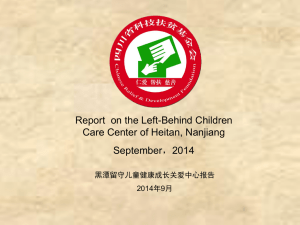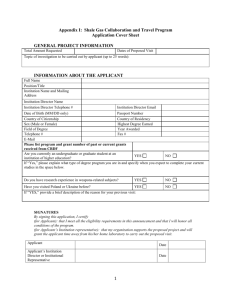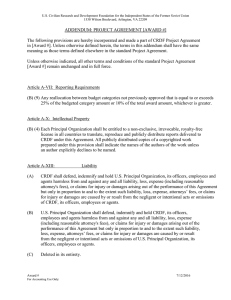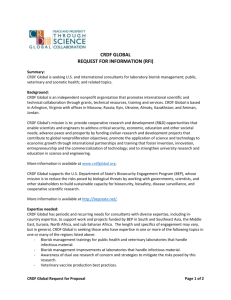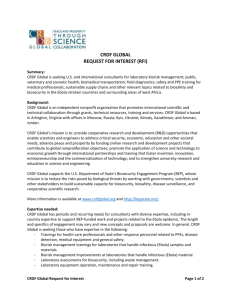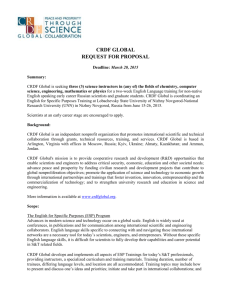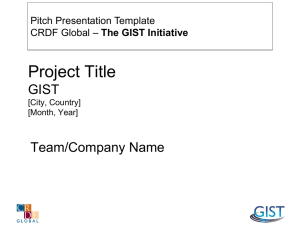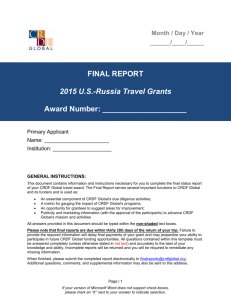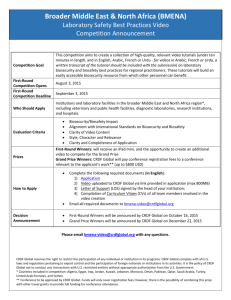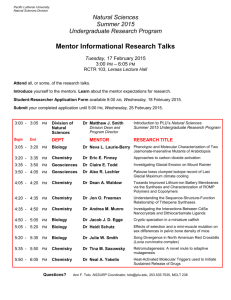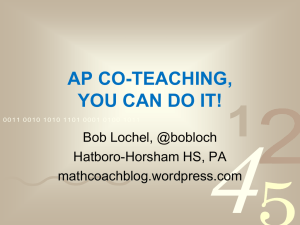Appendix 1
advertisement
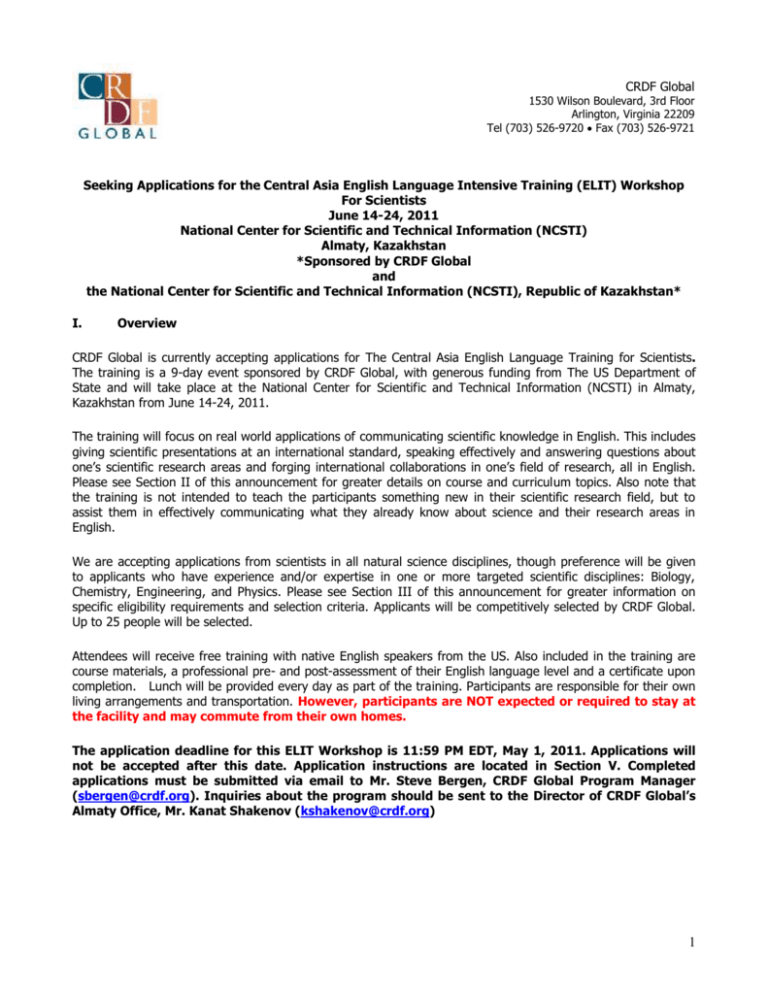
CRDF Global 1530 Wilson Boulevard, 3rd Floor Arlington, Virginia 22209 Tel (703) 526-9720 Fax (703) 526-9721 Seeking Applications for the Central Asia English Language Intensive Training (ELIT) Workshop For Scientists June 14-24, 2011 National Center for Scientific and Technical Information (NCSTI) Almaty, Kazakhstan *Sponsored by CRDF Global and the National Center for Scientific and Technical Information (NCSTI), Republic of Kazakhstan* I. Overview CRDF Global is currently accepting applications for The Central Asia English Language Training for Scientists. The training is a 9-day event sponsored by CRDF Global, with generous funding from The US Department of State and will take place at the National Center for Scientific and Technical Information (NCSTI) in Almaty, Kazakhstan from June 14-24, 2011. The training will focus on real world applications of communicating scientific knowledge in English. This includes giving scientific presentations at an international standard, speaking effectively and answering questions about one’s scientific research areas and forging international collaborations in one’s field of research, all in English. Please see Section II of this announcement for greater details on course and curriculum topics. Also note that the training is not intended to teach the participants something new in their scientific research field, but to assist them in effectively communicating what they already know about science and their research areas in English. We are accepting applications from scientists in all natural science disciplines, though preference will be given to applicants who have experience and/or expertise in one or more targeted scientific disciplines: Biology, Chemistry, Engineering, and Physics. Please see Section III of this announcement for greater information on specific eligibility requirements and selection criteria. Applicants will be competitively selected by CRDF Global. Up to 25 people will be selected. Attendees will receive free training with native English speakers from the US. Also included in the training are course materials, a professional pre- and post-assessment of their English language level and a certificate upon completion. Lunch will be provided every day as part of the training. Participants are responsible for their own living arrangements and transportation. However, participants are NOT expected or required to stay at the facility and may commute from their own homes. The application deadline for this ELIT Workshop is 11:59 PM EDT, May not be accepted after this date. Application instructions are located applications must be submitted via email to Mr. Steve Bergen, CRDF (sbergen@crdf.org). Inquiries about the program should be sent to the Almaty Office, Mr. Kanat Shakenov (kshakenov@crdf.org) 1, 2011. Applications will in Section V. Completed Global Program Manager Director of CRDF Global’s 1 II. Course Topics and Curriculum The training will provide participants with the opportunity to develop their English-language skills in several areas relevant to their scientific research. Topics to be covered during the workshop include, but are not limited to1: Presentation Skills (Speaking and Listening) Reading Comprehension and Analysis: Scientific Texts and Regional Literature Listening and Speaking Skills: Situational Contexts (international conferences, working in a foreign laboratory) Information and Computer Science (general) Writing Skills: Preparing Scientific Abstracts; Publications III. Eligibility Minimum Requirements: Applicants must meet the following eligibility criteria: Citizenship and residence in Kazakhstan2; Existing intermediate-advanced level of spoken English as determined by the attached initial selfassessment and verified by a phone or in-person interview3; P.h.D or equivalent in one of the scientific disciplines outlined in Appendix 1; Current full-time employment in a civilian research environment; and Availability for the full duration of the training and all of its sessions in June 14-24, 2011 (inability to attend all sessions or failure to participate once selected will result in disqualification from the program). Additional Selection Criteria: The evaluation of each proposal will also take into account the following selection criteria: International Collaboration: Previous experience participating in international conferences and/or international collaborative research projects Targeted Scientific Disciplines: Though open to all scientific disciplines, preference will be given to applicants who have experience and/or expertise in one or more of the following: Biology, Chemistry, Engineering, Physics IV. Grant Support Grant support includes all classroom and training costs including course materials, a professional pre and post assessment of English language level and a certificate upon completion. Lunch will be provided each day as part of the training. All participants will be expected to cover their own costs associated with accommodations, ground transportation, and meals. Again, however, please note that participants are NOT expected or required to stay at the facility and may commute from their own homes. Grant support does not cover salary. Selection for this training will be determined by CRDF Global staff. All decisions of CRDF Global are final. Specific topics subject to change; a complete list of topics will be provided closer to the commencement of the training. 2 Availability for the program will be limited to approximately 25 total participants, selected on a first-come, firstserved basis of qualified applicants and in consideration of additional selection criteria listed above. 3 For guidelines on English language proficiency, please see Appendix 3 of this announcement before completing the attached self-assessment. 1 2 V. Application Instructions Each application must include all of the following: 1. Cover Sheet (below) - The cover sheet collects a basic overview of information about the applicant. 2. Current Curriculum Vitae – CVs should contain all pertinent information including full name (as written in your passport), current address, email and other contact details, complete histories of both employment and experience and educational background (post-high school level), current and previous institutional affiliations with dates, scientific area(s) of expertise, and, if applicable, a brief list of your most recent publications. 3. Narrative - Please address the following in a paragraph for each question for a total of no more than two pages. For guidance, please see the CRDF Global evaluation criteria listed above in Section III. Introduction Please describe your current level of spoken English. Please describe what you expect to gain from attending the training. Section on Scientific/Commercial Merit Please describe how improving your English would enhance your current scientific position. Section on International Collaboration What kinds of professional goals/projects would you like to pursue with possible collaborators? How would you like to enhance or collaborations with Western scientists and how would that contribute to your research? 4. English Language Self-Assessment (please see Appendices 3-4) VI. Checklist Please use this checklist to ensure that your application is complete before submitting to CRDF Global: Proposal Item Cover Sheet Current CV Narrative English Language Self Assessment Form (Completed in either in Russian or English) Complete? Y N Y N Y N Y N VII. About the sponsors CRDF Global: CRDF Global is a nonprofit organization authorized by the U.S. Congress and established in 1995 by the National Science Foundation. CRDF Global promotes international scientific and technical collaboration, primarily between the United States and Eurasia, through grants, technical resources, and training. National Center for Scientific and Technical Information: JSC "National Center for Scientific and Technical Information, was established by Government Resolution № 929 of 20 September 2005 on the basis of the Kazakh State Scientific Research Institute of Scientific and Technical Information (KazgosINTI) and through the merger of the Republican Scientific-Technical Library (RLST). The Center is involved in the establishment of public resources, supporting the development of science and technology in the country, and providing access to scientific and technical information. Specifically, the Center is responsible for the collection, processing, and analysis of documentary flows – including maintaining Kazakh doctoral and master's theses, reports on research, science and technology programs, deposited scientific papers, and publications from Kazakh scientists (the Center receives more than 10 thousand units annually). Additionally, the Center provides access to domestic and global information resources to collective and individual patrons (including the government of Kazakhstan) through the provision of a full range of information services. 3 English Language Intensive training (ELIT) Application COVER SHEET Full Name As It Appears on International Passport or Interim Travel Document Position/Title Citizenship Institution Name and Complete Mailing Address Email Address Telephone Number Fax Number Gender (Male or Female) Passport Issue and Expiration Dates Highest Degree Earned Field of Degree (Refer to Appendix 1 of Program Announcement.) Degree Institution and Year Awarded Previous CRDF Global Award? (Yes/No) Institute Director (Name) SIGNATURES Award Number Institute Director Email Address (Required for ALL applicants) By my signature below, I hereby attest that the information contained in this application form is true and accurate, to the best of my knowledge. *All applicants MUST have permission from their Institute Directors to participate in this event. Upon acceptance into the program, CRDF Global will notify both the applicant and Institute Director via email.* Applicant Signature Date Institute Director Signature Date 4 Appendix 1 List of General Scientific Areas and Sub-Disciplines Biological & Biomedical Sciences & Engineering Agriculture & Agronomy Bacteriology Behavioral Biology Biochemistry Biophysics Biotechnology Botany (Plant Biology) Cardiology Cell Biology Conservation Biology Developmental Biology Entomology Environmental Health Epidemiology Genetics Hematology Immunology Marine Biology Medicine Molecular Biology Molecular Medicine Mycology Neurology Oncology Ophthalmology Physiology Population Biology Radiology Toxicology Microbiology Virology Zoology Chemical Sciences and Engineering Analytical & Surface Chemistry Biochemistry Catalysis Chemical Engineering Inorganic Chemistry Organic Chemistry Physical Chemistry: General Physical Chemistry: Kinetics Physical Chemistry: Physical Organic Physical Chemistry: Reactions/Mechanisms Physical Chemistry: Theory & Dynamics Polymer Chemistry Electrical, Materials, and Manufacturing Sciences and Engineering Aero/Astro Engineering Ceramics Composite Materials Electrical Engineering Electronic Materials Instrumentation Lasers Magnetic Materials Manufacturing Materials Science Mechanical Engineering Metallurgy Nuclear Engineering Optical Material Polymers Power Engineering Superconducting Materials Geological Sciences and Engineering Atmospheric Science Civil and Mechanical Engineering Environmental Science Geochemistry Geological Engineering Geology Geophysics Hydrology Meteorology Mineralogy Oceanography Paleoclimate Petroleum Geology Radioactivity Remote Sensing Seismology Soil Science Volcanology Mathematical Sciences Abstract Algebra Applied Mathematics (non-physics) Complex Systems & Chaos Computer Science Geometry & Topology Mathematical Logic & Number Theory Mathematical Physics Mathematical Statistics and Probability Modern Analysis Numerical Methods Physical Sciences Acoustics Astronomy/Astrophysics Atomic and Molecular Physics Beams Condensed Matter: General Condensed Matter: Magnetic Properties Condensed Matter: Structure Condensed Matter: Superconductivity Condensed Matter: Theory and Transport Electronics Fluids Holography Hydrodynamics Lasers Mechanics Medical Physics Nonlinear Optics Nuclear Physics Optics and Spectroscopy Particles and Fields Plasma Physics Space Theoretical Physics Quantum Computing and Cryptography Quantum Statistic 5 Appendix 2 English Language Intensive Training (ELIT) Curriculum The following list includes possible course topics to be covered during the English-Language Intensive Training (ELIT) in Almaty, Kazakhstan (June 14-24, 2011). Please note that the curriculum has not yet been finalized and this list is not meant to provide an exhaustive description of ELIT courses. A final list will be confirmed closer to the event. Please do not hesitate to contact Steve Bergen, Program Manager (sbergen@crdf.org) with any questions or concerns. The 2011 ELIT in Almaty, Kazakhstan may include the following topics in its curriculum: Presentation Skills (Speaking and Listening) Reading Comprehension and Analysis: Scientific Texts and Regional Literature Listening and Speaking Skills: Situational Contexts (international conferences, working in a foreign laboratory) Information and Computer Science (general) Writing Skills: Preparing Scientific Publications Appendix 3 English Proficiency Level Descriptions Proficiency Level Intermediate Advanced Low High Low High Listening Understands most questions and conversations on familiar topics spoken distinctively at normal speed; requires occasional restatement or clarification. Understands most informal questions, statements, and conversations at normal speed. Comprehends lectures on familiar topics with some difficulty. Understands most conversations and most lectures on familiar topics spoken at normal speed. Understands academic topical conversations and most lectures without difficulty. Speaking Handles with confidence but not facility most daily speaking tasks. Can handle limited academic language and will need help for most tasks. Vocabulary is limited. Participates effectively and sometimes hesitantly in social and academic conversations. Makes occasional errors in idioms and structure. Speaks English in most situations. Comprehension is quite complete for a normal rate of speech. Makes occasional errors in idioms and structure obscuring meaning. Uses the language fluently on all levels normal to professional related needs. Understands and participates in almost any conversations within the range of experience with a high degree of fluency. Reading Understands simple material (messages, greetings, popular advertising, letters, and invitations). Can guess at unfamiliar vocabulary if highly contextualized. Understands short discourse on familiar topics. Misinterpretations still occur with complex material. May have to read material several times and may need clarification. Reads simple printed material within a familiar context. Can read uncomplicated prose on familiar subjects in frequently used sentence patterns. Reads the facts but cannot draw inferences. Understands most factual information in non-technical prose as well as some discussion on concrete topics related to special events. Able to read for information and description, to follow sequence of events, and to react to that information. Able to separate, locate, and interpret main ideas and details. Reads standard newspaper items addressed to the general reader, routine correspondence reports and technical materials. Gains new knowledge from materials in unfamiliar topics in areas of a general nature. Can interpret hypotheses, support opinion, and conjectures. Able to “read between the lines.” May be unable to appreciate nuances or style. Writing Composes short paragraphs or takes simple notes on very familiar topics. Evidence of good control of basic sentence construction and inflections (subject/verb agreement) and straightforward syntactic constructions in present, past, and future tense though errors occasionally occur. Takes notes in some detail on familiar topics and responds to personal questioning using elementary vocabulary and common structures. Expresses fairly accurately present and future tense. Produces some past verb forms, but not always accurately or with correct usage. Writes simple social correspondence, takes notes, writes summaries, describes factual topics. Makes common errors in spelling and punctuation. Shows control of most common conventions. Joins sentences in limited discourse. Difficulty in producing complex sentences. Paragraphs are reasonably unified and coherent. Uses written English in most exchanges. Writes short papers & expresses statement of position, points of view and arguments. Good control of structure, spelling, & vocabulary. Uses complex & compound sentences and structures to express ideas clearly & coherently. Some problems tailoring writing to a variety of audiences and styles. Appendix 4 Self-Assessment of spoken English Choose a number from 1 (lowest; not at all; never; disagree) to 5 (highest; completely; always; agree), in response to the question. (Indicate your responses in the right-hand parentheses.) 1. I interact regularly with native English speakers and have no trouble expressing myself. 1 2 3 4 5 ( ) 2. I can use spoken English in almost all professional and social settings without difficulty. 1 2 3 4 5 ( ) 3. I can easily speak in English about things directly related to my scientific field. 1 2 3 4 5 ( ) 4. I know the vocabulary to deal with most situations that are likely to arise when traveling in a country where English is spoken. 1 2 3 4 5 ( ) 5. I can use simple phrases and sentences in English to describe where I live and people I know. 1 2 3 4 5 ( ) 6. I can present clear, detailed descriptions in a wide range of subjects in English. 1 2 3 4 5 ( ) 7. I can express my moods and feelings to native speakers of English without significant difficulty. 1 2 3 4 5 ( ) ( ) 8. I understand the basic pronunciation rules for British or American English. 1 2 3 4 5 9. I can easily speak about my specialized field in science in English without great difficulty. 1 2 3 4 5 ( ) ( ) 10. I am shy and have trouble speaking in front of crowds (1=very; 5=not at all). 1 2 3 4 5 Самостоятельная оценка уровня разговорного английского. Выберите цифру, наиболее соответствующую ответу на поставленный вопрос: от 1 (меньше всего; категорически нет; никогда; категорически не согласен) до 5 (да; совершенно верно; всегда; абсолютно согласен). (Укажите выбранную цифру в скобках справа). 1. Я часто общаюсь с иностранцами, говорящими на английском языке. Общение происходит свободно, проблем с пониманием не возникает. 1 2 3 4 5 ( ) 2. Я свободно говорю по-английски, как на общие темы в кругу друзей, так и на профессиональные темы в официальной обстановке. 1 2 3 4 5 ( ) 3. Я свободно говорю по-английски на темы, непосредственно связанные с моей научной деятельностью. 1 2 3 4 5 ( ) 4. У меня достаточно словарного запаса, чтобы объясниться в большинстве ситуаций, которые могут возникнуть в поездке по англоязычной стране. 1 2 3 4 5 ( ) ( ) 5. Я смогу объяснить, где живу, и рассказать о своих знакомых по-английски. 1 2 3 4 5 6. Я могу четко и достаточно глубоко рассуждать на самые разнообразные темы по-английски. 1 2 3 4 5 ( ) 7. Я могу достаточно свободно рассказать о своих впечатлениях, чувствах, настроении, по-английски. 1 2 3 4 5 ( ) 8. У меня имеется представление о правилах произношения, принятых в британском (американском) английском. 1 2 3 4 5 ( ) 9. Я свободно, без каких-либо затруднений, обсуждаю по-английски темы, относящиеся к кругу моих профессиональных интересов. 1 2 3 4 5 ( ) 10. Признаться, я не очень люблю выступать перед большой аудиторией. Чувствую себя крайне неловко. (1=именно так; 5=совсем не так). 1 2 3 4 5 ( )
